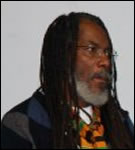The piece of scholarship entitled "Casting the first stone!: Policing of Homo/Sexuality in Jamaican Popular Culture" (2004) by former lecturer and mentee Cecil Gutzmore is thus far the most comprehensive treatise I have come across in situating homophobia as a cultural trait within the Jamaica (Caribbean) society. The paper succeeds in identifying three 'meta'-discursive "ideological imperatives", namely:
- religious/biblical fundamentalist anti-homosexuality
- rhetoric of the unnaturalness of homosexuality and the naturalness of heterosexuality (what I might term sexual essentialism)
- rhetoric around protecting vulnerable youth (presumed to be susceptible to come under undue influence from homosexuals and acts of homosexuality)
Perhaps the genius of the article, for me, lies with the ease with which one can relate to these modes of discourse, which- although when taken individually, are not 'endemic' to Jamaica (Caribbean culture)- constitute a particular form and degree of denonciation of homosexuality. The most imperative of these imperatives, I would suggest, is fundamentalist religious discourse which provides the most 'researched' argument against 'sodomistic' desire and finds the loudest expression in standardised/regurgitated popular discussion. Religiously-informed homophobia is also the most uncritical and pre-reflexive of the suggested forms of anti-homosexuality since it erects a priori (i.e. before the consideration of reason) the absolute evil of acts of homosexuality as "reprobate" and "abominable". I should pause here to note that there is an academic distinction to be made between 'acts of homosexuality' and 'homosexuality as a psycho-sexual orientation' but an elaborate discussion on this is not necessary for the purposes of introducing a debate surrounding Gutzmore's article.
A subjacent issue that is consistently touched on (as if a point of unease) and that perhaps needs some amount of future consideration by Gutzmore, is that of whether it can be said that homophobia in Jamaica is, in its 'exceptionality', characterised by a greater level of 'fear' and 'dislike' than which occasion such forms of bigoted intolerance in the West or even in other parts of the collectivised 'extra-Western' World. Is Jamaica singularly intolerant in its virulent denonciation of homosexuality in 'religious', 'secular-popular' and 'official' spaces? Or does Jamaica's violent/aggressive engagement with anti-homosexual expression reflect a more general socio-cultural engagement with violence/aggression? And what to make of the perspectives of Jamaicans themselves who often present heteronormativity as a subaltern, subversive insularisation from Western oversecularisation, decadence and hedonistic anomie?
The following is the abstract of Gutzmore's article which can be found at http://www.hawaii.edu/hivandaids/Casting_the_first_stone__Policing_of_Homo_Sexuality_in_Jamaican_Popular_Culture.pdf:

The paper explores and intervenes against homophobia in the specificities of its manifestation in Jamaican popular and official culture. It leads to an acknowledgement of the verbal, emotional and physical violence of Jamaican homophobia, and a denial that there is any comparative evidential basis that this is its distinguishing feature internationally. The paper locates the distinctiveness of Jamaican homophobia; the peculiar convergence in the public virulence of the anti-homosexuality of both the religious and the secular popular, as well as of official culture; the unique, near obsessive, antihomosexuality of the dancehall/ragga deejay genre; the societal violence proneness and a tendency towards lawlessness. The paper argues for a departure from the condemnatory stance that characterizes challenges to Jamaica’s homophobia and, instead, identifies five homophobic imperatives – religious fundamentalism, heterosexual naturalism, legalism, cultural nationalism and child-protection – which are held to drive the discriminatory discourses and practices. The paper seeks to initiate the analysis of these imperatives as the basis of a necessary conversation between progressives and homophobes towards the production of a less oppressive cultural and sociolegal atmosphere in Jamaica.


Aucun commentaire:
Enregistrer un commentaire